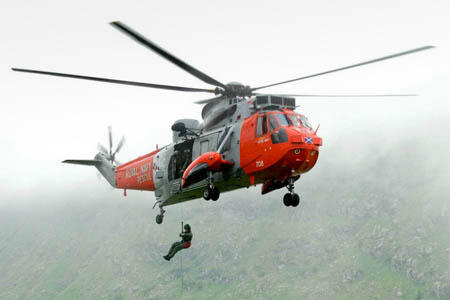A rescue helicopter crewman faced an unexpected challenge when called to help two stricken climbers on Ben Nevis.
Sergeant Andy Dixon, an RAF aircrewman and paramedic on exchange to the Royal Navy, was on board the Sea King craft sent to search for the two climbers on the north face of Britain’s highest mountain on Saturday.
The rescuers were alerted by Fort William police at 1.40pm and Sgt Dixon was winched down to the pair and immediately realised he had a problem: he couldn’t communicate with the climbers.
A spokesperson for the Royal Navy said: “Arriving beside the climbers, Andy found that they were both French and spoke no English, therefore making diagnosis very tricky.
“He was able to make an assessment on the pair, though, and elected to winch the stricken duo straight out in order to expedite the rescue as speedily as possible.
“The casualties were then transported rapidly down the mountain to a waiting ambulance and a doctor from the mountain rescue team.”
The Sea King and its crew then returned to their base at HMS Gannet, Prestwick, but were in the air again within an hour, heading south to rescue another climber in the Lake District, stuck on Great End, in the Scafell range.
The spokesperson continued: “The crew arrived on scene to find that Keswick Mountain Rescue Team had not only reached the casualty, but also recovered them to safety. And they were able to return to base knowing that the climber was in safe hands, landing back at base at 7.40pm.”
Pilots Lieutenant George ‘Logie’ Baird and Lieutenant Andy Ellis and observer Lieutenant Commander Dave Reese were on the craft with Sgt Dixon.
The flights to the northern and southern extremities of the crew’s area came in a busy week for the helicopter rescuers, the busiest in the country.
Six people were rescued in a week, including a casualty who had fallen overboard from a boat in Argyll; an injured person from a road crash in Stirlingshire and a request to search for two missing people in Northern Ireland.
The Royal Navy’s Ayrshire-based men and women cover a huge area of the west of Scotland, northern England and Northern Ireland, covering 253,819 sq km (98,000 sq miles) – more than 12 times the size of Wales.
In 2009, HMS Gannet broke its own record of the previous two years for the highest number of call outs, with 447, rescuing 378 people, and making it the UK busiest helicopter search and rescue unit since records began. This was a callout increase of 65 on Gannet’s 2008 record figures of 382, when 347 people were rescued. Again, this beat the previous record of 2007, also set by the unit, of a callout tally of 359, assisting 349 people. Figures for last year have yet to be released.

Martin
12 January 2011Surely "M'aidez"?
Bob
12 January 2011Well, you could argue that, but it's generally thought that the distress phrase 'mayday' derives from the French 'Venez m'aider'. Otherwise it would be likely to be the imperative form 'Aidez-moi'.
Grammar homework in by Friday, class.
Bob Smith, rédacteur